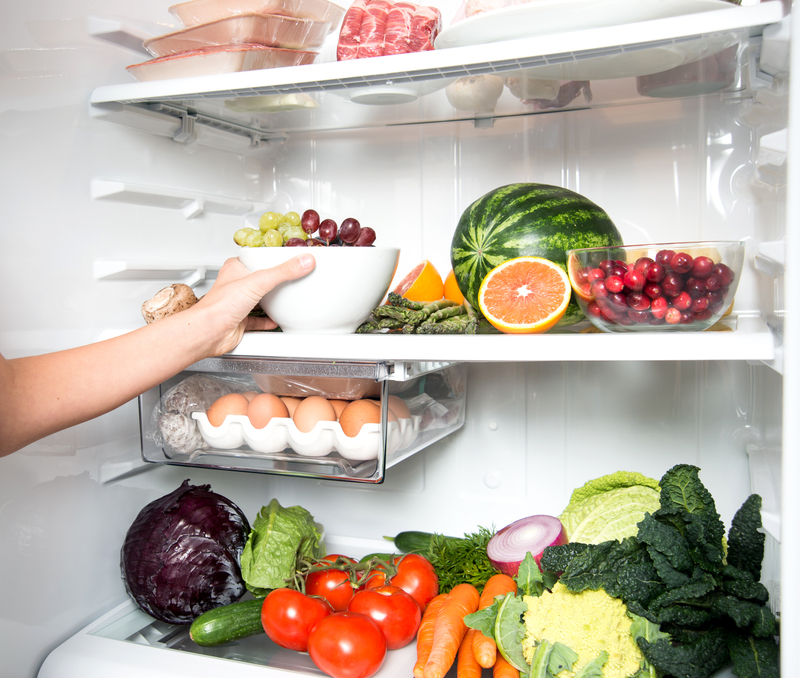Proper Storage Solutions for Your Unused Freezer
Posted on 18/05/2025
Comprehensive Guide: Proper Storage Solutions for Your Unused Freezer
An unused freezer in your home or commercial space can be both a burden and an opportunity. Instead of letting it collect dust or become cluttered with random items, you can maximize its value by adopting correct storage solutions that keep your belongings safe, organized, and easy to access. This article offers a thorough exploration of proper storage solutions for your unused freezer, delivering insightful, practical, and SEO-optimized tips you can implement today.

Why Focus on Proper Storage for Your Unused Freezer?
While your freezer was primarily designed for food preservation, once out of commission, it can be repurposed in numerous creative ways. Storing items safely and efficiently is crucial for optimal usage and longevity. Here's why it's important to find the right storage techniques:
- Prevents Damage: Unplanned storage leads to mold, rust, and deterioration.
- Reduces Clutter: Organized use keeps your home, basement, or garage neat.
- Prolongs Freezer Life: Even when unused, managed storage prevents wear on interior surfaces.
- Repurposes Space: Offers an affordable, creative alternative to renting storage units or buying cabinets.
Preparing Your Unused Freezer for Storage
1. Thorough Cleaning is Essential
Before you store anything inside your freezer, it's critical to clean and dry it properly. This is the foundation of every safe storage solution for unused freezers:
- Defrost Completely: If frost remains, it will melt and create moisture--leading to mold or corrosion.
- Use Baking Soda and Vinegar: These natural cleaners remove odors and bacteria.
- Dry Thoroughly: Use towels and let the appliance air-dry for several hours, even days if possible.
- Deodorize: Place an open box of baking soda or activated charcoal inside for a day to absorb any remaining smells.
2. Ensure Good Ventilation
Avoid mustiness and mold by keeping the freezer door slightly ajar. Use a rolled towel, a wooden block, or built-in door mechanisms. Proper airflow inside will:
- Reduce the risk of stale odors.
- Prevent moisture buildup and condensation.
- Discourage insects and pests from nesting.
3. Disable the Appliance Safely
Even when not in use, ensure the freezer is unplugged and disconnected from any water supply. Also, secure or tape down cords to prevent tripping hazards or accidental power-ups.
Best Items to Store in an Unused Freezer
Rethinking your unused freezer as a smart storage vault can help organize everything from household goods to seasonal items. Here's a strategic list of recommended items:
- Pantry Staples: Flour, grains, rice (in sealed containers to prevent pests).
- Camping Gear: Lanterns, fuel canisters, utensils, and camping stoves.
- Emergency Supplies: Flashlights, first aid kits, batteries, bottled water.
- Gardening Tools: Hand tools, gloves, seed packets.
- Sports Equipment: Small balls, cycling accessories, workout bands.
- Craft Supplies: Paints, yarn, glues, beads, and brushes.
- Seasonal Decorations: Holiday lights, ornaments, Halloween or Christmas decor.
- Documents and Photos: Stored in waterproof and airtight containers for extra protection.
- Children's Toys: Organize lesser-used toys, action figures, or games.
- Pet Supplies: Spare leashes, collars, grooming tools.
What NOT to Store Inside an Unused Freezer
Avoid These Items
- Perishable Foods: Even if the freezer works, without power, perishables spoil fast.
- Flammable Liquids: Cleaning solvents or gasoline pose fire hazards.
- Heavy Tools and Machinery: The inner liner isn't designed for heavy loads.
- Wet Items: Damp objects create an environment for mold.
- Unprotected Valuables: Delicate electronics or jewelry need extra, sealed protection.
Creative Storage Solutions for an Unused Freezer
1. Turn It into a Locked Storage Cabinet
Older freezers often have reliable built-in locks. If you need secure storage (e.g., to keep chemicals or sensitive materials away from children), this is an ideal repurposing. Label your freezer as "Storage Only--No Food" to avoid confusion.
2. Install Custom Shelves or Bins
Increase capacity and organization by adding wire shelving, stackable boxes, or plastic bins inside the freezer cavity. Properly labeled bins ensure easy retrieval and clear categorization of every stored item.
3. Upgrade to a Dry Storage Pantry
Your unused freezer is exceptionally good at providing a pest-free, dark environment. Store pantry overflow, baking ingredients, or even bulk spices in sealed containers to maximize protection from pests and light degradation.
4. Create an Emergency Supply Locker
Every home needs an emergency preparedness kit. Your old freezer can double as a disaster readiness locker. Waterproof boxes, blankets, and flashlights can be stored safely until needed--keeping you ready for any scenario.
5. Use As a Tool Chest
A chest freezer's deep cavity makes a great vertical storage for longer tools, while upright models suit items like extension cords, garden stakes, and hand rakes.
How to Organize an Unused Freezer for Maximum Utility
- Sort by Category: Dedicate spaces for specific item groups (e.g., "Gardening" or "Holiday").
- Use Transparent Storage Containers: This allows instant visibility, so you don't dig around blindly.
- Label Everything: Clear labels avoid guesswork and let every family member know what to find where.
- Store Heaviest Items at the Bottom: To avoid crushing lighter or more delicate goods.
- Rotate Stock: If you're storing seldom-used but still-needed items, check on them every 6-12 months for freshness or viability.
Moisture Management: Keep Your Belongings Safe
Protection from Mold and Rust
Even unplugged, unused freezers can trap humidity. Moisture is the enemy of long-term storage. Here's how to safeguard your belongings:
- Use Desiccant Packs: Silica gel packets, dehumidifier packs, or activated charcoal reduce humidity.
- Avoid Direct Contact with Liner Walls: Place items on racks or inside boxes.
- Line with a Towel or Mat: Absorbs minor drips or condensation.
- Monitor Regularly: Set a quarterly calendar reminder to inspect for smell, dampness, or visible mold.
Unplugged Freezer Safety: Tips for Households with Children
A noteworthy safety hazard: Unused freezers can trap children or pets inside if the lid shuts accidentally. To prevent this:
- Remove the Door or Lid entirely if feasible.
- Install an External Lock or Childproof Latch if you plan on using the freezer for storage.
- Position Well: Keep it in a visible or regularly trafficked area, not hidden in a remote basement corner.
- Educate the Household: Make sure everyone understands that the freezer is for storage, not play.
Maintaining Your Unused Freezer Storage Space
- Check Seals and Gaskets: Ensure they are intact to prevent pests from taking up residence.
- Refresh Deodorizers Biannually: Replace used-up baking soda or charcoal to keep odors at bay.
- Clean Surfaces: Wipe down with a mild, soapy solution annually.
- Reorganize Periodically: Take inventory and adjust for new needs or seasons.
Creative and Eco-Friendly Disposal: If Storage Is Not Needed
If your unused freezer no longer fits your needs, consider these eco-friendly alternatives to dumping it in a landfill:
- Recycle for Scrap Metal: Most major appliances are recyclable.
- Donate to a Local Charity: Some organizations refurbish or repurpose old appliances.
- Trade or Sell for Upcycling Projects: Many DIY enthusiasts want freezers for beer brewing, smoker builds, or furniture projects.

Frequently Asked Questions (FAQ) on Storing Items in Unused Freezers
- Q: Is it safe to store clothes in an unused freezer?
A: Clothing should be packed in airtight plastic containers with silica gel for best results. Ensure the freezer is totally dry before adding fabrics. - Q: How do I keep my stored items from getting moldy?
A: Always clean, dry, and use desiccant packs before sealing the door. Leave a small gap for airflow if possible. - Q: Are unused freezers critter-proof?
A: They are better than boxes, but small pests may sneak in through faulty seals. Inspect and replace gaskets as needed. - Q: Can I store tools in an unused upright freezer?
A: Absolutely! Just avoid overly heavy or rust-prone items unless you use anti-corrosive linings and packs.
Proper Storage Solutions for Your Unused Freezer: The Bottom Line
With a bit of creativity and organization, your unused freezer can become an essential and versatile storage solution. Maximize your existing assets rather than wasting money or space. Remember to clean, ventilate, organize, and periodically maintain your freezer for best results. By following the storage guidelines outlined above, you protect your belongings from damage and make your home or workspace more organized and efficient--at essentially zero cost!
Looking for more tips? Bookmark this page and refer back anytime you need new ideas for storage solutions for freezers not in use. Don't let that appliance go to waste!
Latest Posts
Smart Techniques for Relocating Your Bed and Mattress
Your Ultimate Checklist for Decluttering Before Moving House
Sofa Storage: Extend Your Furniture's Life with Expert Tips



